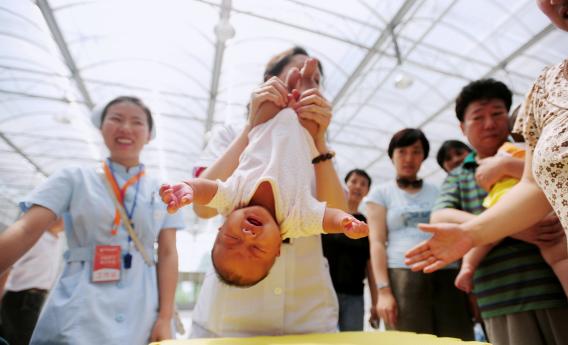Want to Give Your Baby a Head Start? Focus on Motor Skills, Not Enrichment

Photo by Stringer/AFP/Getty Images
The small humans of America are the most razzle-dazzled, overstimulated, bugged-out small humans in the world. (Survey says.) It’s not working out so well. I suggest we shift our focus: from cognitive development to motor. And at least in the short-term, I guarantee results.
Evidence from around the world shows that early work in motor development actually has effects. Kipsigis infants in Kenya are famously trained to sit by being placed in muscle-stressing dugout holes. Nso babies in Cameroon are taught to walk, toddling along poles for balance. Practice makes perfect: The Kipsigis sit up earlier than we do; the Nso walk earlier. (The psychologist Philip Zelazo ran roughly the same experiment on his own son. It worked.)
We cannot prod our children toward genius. But we can prod them toward seriously precocious roller-skating. That’s not nothing.
A little less than a century ago, this country was riveted by the spectacle of Jimmy and Johnny Woods, twins who were from birth the subject of a very simple experiment: What would happen if you gave Johnny massive amounts of physical stimulation, if you treated him like a future Olympian—and if you treated Jimmy like a normal kid? The project of the psychologist Myrtle McGraw, it was sensationally successful almost immediately. Johnny swam underwater at 9 months. He roller-skated at 12 months. Just shy of 14 months, he dove headfirst into a pool. At 15 months, he swam 20 feet with his head in the water. It was all captured on film. Time magazine covered it.
Against the all-or-nothing perspectives of the time—neural maturation is all; no, learning is all—McGraw favored complexity. She thought that neural maturation and learning both mattered. They interacted. Before a baby would get around to something on his own, his environment—a team of relentless psychologists, or a dug-out hole—can inspire it.
Johnny’s training, five days a week for two years, was intense. Then the workouts stopped. By the time the twins were 6, Jimmy had pretty much caught up. Johnny was still more coordinated, though, and more confident. All those months at the gym had paid off.
If you are not willing to consign your child to an infancy spent at LA Fitness, there is a slack-ass option: Spin her in an office chair. In what may be the most entertaining experiment in the developmental literature, babies who are spun in a chair—20 times twice a week, for a month—score higher on later motor development measures than babies who are not. It only looks like silliness. It is actually vestibular simulation.
This is my contribution to overstimulated, passive-aggressive, hyper-anxious American parenting: If you really love your child—if you want to give her a head start in life—then twirl her around without mercy.
